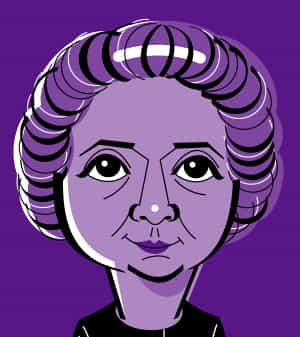The Discovery that Led to a Scientific Breakthrough
In the late 1800s, Marie Curie made an amazing discovery. In 1895, German scientist Wilhelm Roentgen discovered a special type of ray that could travel through flesh and take pictures of people's bones. This ray became known as the X-ray. One year later, Henri Becquerel discovered that the mineral uranium also emitted rays. After two months of research, Marie discovered that the more uranium in the mineral sample, the greater the intensity of the rays. Over time these rays break down to release large amounts of energy. While studying the radioactivity of a mineral called pitchblende, she discovered two new elements—polonium and radium. (Marie called this phenomenon radioactivity.) For her research on radioactivity, Marie Curie became the first woman to win a Nobel Prize. In fact, Marie later went on to win another Nobel Prize, this time in chemistry. Thanks to Marie's research, X-ray machines and radium are used to help save millions of lives every day. Radiation is also used to help cure cancer.
Date of Birth: November 7, 1867
Date of Death: July 4, 1934
Hometown: Warsaw, Poland
Position: physicist, mathematician
Education: Floating University, the Sorbonne in France
Known for: discovery of the elements polonium and radium
Most notable awards: Nobel Prize in Physics (1903); and Nobel Prize in Chemistry (1911)
Curie died as a result of:
old age
a car accident
exposure to radiation
Correct!
During the early 1900s scientists began to see the dangerous effects of radiation exposure. Marie Curie began to suffer from dizziness, fatigue, and a constant ringing in her ears. She died at age 70 from radiation poisoning.
After Marie Curie graduated from high school, she attended a secret university called the:
Floating University
Hideaway School for Women
CIA
Correct!
During the time of czarist rule in Poland, women were prohibited from attending college. Before Curie attended the Sorbonne, she and her sister Banya attended the Floating University that met in different secret locations.
Marie Curie won only one Nobel Prize in her lifetime.
Fiction
Marie Curie was the first woman to win a Nobel Prize. She won two Nobel Prizes -- one in physics and one in chemistry.
Be less curious about people, and more curious about ideas.

Marie Curie




 Biodiversity
Biodiversity
 Brain
Brain
 Genetics
Genetics
 Marine BiOLogy
Marine BiOLogy
 MicrobiOLogy
MicrobiOLogy
 PaleontOLogy
PaleontOLogy
 ZoOLogy
ZoOLogy
 AnthropOLogy
AnthropOLogy
 ArchaeOLogy
ArchaeOLogy
 Astronomy
Astronomy
 Climate Change
Climate Change
 Earth
Earth
 Physics
Physics
 Water
Water
